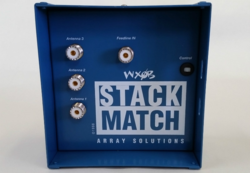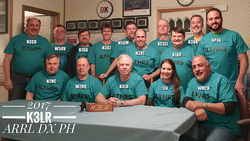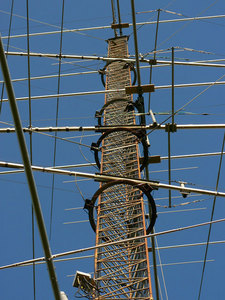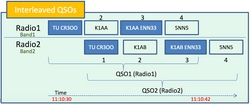 March 22, 2017 Editor: Paul Bourque, N1SFE | |||||||||||||||||||||
IN THIS ISSUE
As the winter weather recedes (ahem), how about putting up some wire antennas to get on some different bands? The ARRL website has plenty of resources for all sorts of wire antennas, and a resonant dipole is a good choice for a specific band. By making the antenna resonant, you can reduce potential losses in tuners or tuning networks and coax, and reduce out-of-band signal reception . Be sure to follow precautions to keep away from power lines, be mindful of grounding, and make sure that humans aren't able to be in contact with it. Complete information for all contests follows the Conversation section March 23 March 24 March 25 March 26 March 29 March 30 March 31 April 1
April 2 April 3 April 4 April 5 Richard Norton, N6AA, Director, ARRL Southwestern Division, recently provided an update on California's Distracted Driving Law. This is relevant if you are planning on using Amateur Radio gear while operating a motor vehicle in California. Anyone planning on operating while driving in California should read the entire update, and understand that the situation is still evolving. (Dennis, N6KI) Researchers believe that not all hearing loss types may be detectable with standard hearing tests. One type of deficit thought to be caused by exposure to loud noise is indicated by difficulty understanding conversations taking place in noisy environments. The conjecture is that loud noise can degrade the ability of a portion of the auditory nerves to deliver enough information to the brain. (Tim, K3HX) Registration for the Contest Dinner at the International DX Convention in Visalia, California is now open. "Everything is pretty much the same as last year. Please plan to be here, I'm sure the featured presentation will not disappoint!" - Jeff, WK6I. The DailyDX celebrated its 20th Anniversary on March 17, 2017. Congratulations! Obtaining QSL cards has been made so much easier and more efficient by Online QSL Request Systems set up by the DX stations or their QSL Managers, that it's hard to imagine why any DX station would choose to not use OQRS. Online QSL Request Systems eliminate physical paperwork aspects of requesting QSLs from DX stations by replacing it with a web-based form. M0URX operates one OQRS System, and has put together a Question and Answer page about how his system works. (The Daily DX, and Ward, N0AX) The March 2017 QST reviewed the Array Solutions RA-S1 Digital Rotator Controller. It has the ability to control Yaesu, HyGain, Pro.Sis.Tel., and Orion type rotators, and may provide an upgrade of functionality to some model's original controllers. The RA-S1 features ramp-up and ramp-down of rotator speed, point and shoot positioning, as well as computer control via RS-232 or USB interfaces, using the commonly supported GS232A rotator protocol. It's also upgradeable via its own USB interface. Sitting in front of a computer with headphones on for extended periods, with a steady intake of caffeine and snacks, has proven to be hazardous for computer gamers, too. Michigan Amateurs - if you'd like to attend the Hamvention but don't want to drive, the Arrow Communication Association offers a bus option. Departing the Ann Arbor area at 4:00 AM on Saturday, it arrives at the Hamvention at approximately 8:00 AM. The return trip is after 5:00 PM the same day. See the website for more information. The first-ever Florida State Parks on the Air Contest will be held April 1, 2017 from 1400z to 2200z. This mixed-mode contest has plenty of multipliers: There are 172 Florida state park entities, and K4LKL is a special 'bonus' station. Rules are available on the contest website. N1MM support files for the contest are available as well.
In the last Contest Update issue, I mentioned using a StackMatch device to combine multiple antennas on a tower. Jay, WX0B, writes: "It's amusing how a name I coined for Stacking antennas has migrated into a commonly used term. The first one was sold 27 years ago. I also wrote an article in the NCJ about using the first ones for my stacks. That's what actually started Array Solutions, it was the first product and demand for it came from the NCJ article." Technology is challenging the concept of fair competition in the sport of running. Some shoes are said to give competitors too much of an edge. Perhaps runners using these shoes will have to enter the "assisted" category. Stochastic - adjective: being able to be described statistically, but not precisely. In the context of contesting, run rates are stochastic. If the rate is 60 QSOs per hour, contacts do not occur each minute - there are bursts and dry spells. Testing a hamfest find before you buy it could be made easier with this project for a pocket-sized variable power supply capable of powering a wide range of battery-powered devices. (Dennis, N6KI) Array Solutions has published some instructional videos related to the OM2500A amplifier. One of them describes how to tune the amplifier manually and then store the tuned values into the amplifier's memories. The method for manually tuning is applicable to other tetrode based amplifiers. Preliminary results from the NCJ CW Sprint have been posted. Ohio QSO Party results are on the OHQP website. August 26 is the date for the 2017 edition.
In the recently concluded ARRL DX Phone Contest, among US multi-multi stations K3LR appears to have bested the efforts of W3LPL and WE3C. The unofficial results from 3830scores.org:
I asked Tim if there was any "secret sauce" he'd used during the event: 'We had a great operator team on all bands, and the station worked 100% without any problems. Our USA Multi-Multi competition with W3LPL and WE3C always makes it a great race. On 20 meters four 6-element beams starting at 230 feet doesn't hurt either! We have 6 elements at 230 feet over 6 elements at 170 feet over 6 elements at 110 feet over 6 elements at 50 feet. This 20 meter stack is one of the tallest and largest 20 meter arrays in the world. Then we have N2NT, K1AR and N3SD behind the 20 meter microphone and you have the 'sauce.' Assuming our #1 position for 2017 is confirmed after log checking it will be the 14th all time win for K3LR USA MM in this contest. K3LR has won all ARRL DX SSB contests since 2004 with the exception of 2009, which was won by W3LPL."
Helping with the Exchange Helping a station through a contest exchange during a phone contest is a courteous thing to do, and at slow times may not damage your rate. Why not also invest in a faster rate for future CW or RTTY contests by noting calls that are sending non-standard or inefficient exchanges, and following up with a polite email outside of the contest with suggestions on how to improve their exchange for the next time. Newer contesters may just be using the default messages included with their logging program, which can sometimes stand improvement. In last weekend's BARTG contest, for which the exchange is signal report, QSO number, and time of day, I noticed WQ6X sending 5NN as the signal report, so I emailed him (politely) to remind about the saving a couple of characters. Ron replied that his exchange was intentional: "I prefer 5NN because it is then CLEAR that it is not a QSO number or time of day; especially during data garbling. It was WAY easier to log stations that sent 5NN then those that didn't." Well considered!
Jose, CT1BOH, has been refining a technique he's developed for super high rate two radio operation which he's calling "Two Bands, Synchronized, Interleaved, QSOs." According to Jose, 2BSIQ is a technique that derives its success by using fixed time intervals for each phase of a QSO, and controlling the relationship of one radio's stream of QSOs to the other. His presentation on this technique explains the evolution of this technique from its roots in SO2R and multi-single operation, and how the operating stricture provides its advantage. He also offers some insights on how the technique might be able to be used from targeted locations to challenge the 2000 EA8BH SOAB record, even in this time of reduced propagation. There is an abundance of information to digest in this presentation, and the data and strategic insights could help others improve efficiency in other entry categories. USB 3.0 devices and cables have the possibility of radiating across a wide range of frequencies from LF to beyond 7.5 GHz. This Intel paper discusses the specific case of USB 3.0 interference to 2.4 GHz band devices, but contains information on USB 3.0 radiation characteristics and potential ways to mitigate that radiation. (Jim, K9YC, via RFI Mailing list) The March 2017 issue of the Northern California Contest Club's The Jug (PDF), provides a peek inside the high-power-capable 4O3A 80 meter bandpass filter. According to Gary, NA6O, "For $500 you get a first-class piece of radio hardware from someone who clearly knows what he is doing and knows how to build it right." Side-mounting an antenna to an existing tower can be a way to get another antenna off the ground without adding a new tower. Last year VE3VN published a review of various techniques for side-mounting beams. KF7P Metalworks has a design that works with many Rohn towers, and can handle up to 100 pounds. Paul, K7PN, is also known for providing custom side mounts for rotators and beams. Texas Towers represents Rohn and WA9IIX side mount products. PwnToOwn 2017, sponsored by Zero Day Initiative, recently concluded in Vancouver. PwnToOwn involves teams competing to find methods to exploit web browsers or sandbox environments for escalated access to the underlying operating system. Successful exploits, if used for nefarious purposes, can enable malware installation merely by visiting a webpage. By finding exploits in the competition, they can be mitigated by software manufacturers before malware authors can use them. This year, over $800,000 in cash prizes was awarded for unique, impactful, or innovative exploitation methods. In several cases the individual bounty for an exploit exceeded $100,000. Al, W6LX, has put together a K3 AGC White Paper (PDF) describing how the AGC system on the Elecraft K3 works, and how changes in various settings affect the AGC. IKEA furniture + Makers = Personalized Maker Space! An IKEA Husar cabinet is being used by one enthusiast to contain an impressive electronics workspace. Homebrewing at a Higher Level A couple of days ago, I attended a presentation by a large non-US manufacturer of electronic products, electronic modules, and test equipment. They've had great success in serving the DIY and Maker markets with their computing and interface items. Amateurs have been combining them with other RF components for radio projects in numbers large enough to be noticed. Seeking to expand their business, the company is now planning to make RF-specific modules to be used with their existing general-purpose products. Hearing from a manufacturer that forecasts enough vibrancy and growth to enter the Amateur Radio market is refreshing, and points to a trend of experimenters building at higher levels, using modules or PCBs versus individual parts. It's also one datapoint that validates the hypothesis that one avenue for entry into our hobby is via the Maker movement. That's all for this time. Remember to send contesting related stories, book reviews, tips, techniques, press releases, errata, schematics, club information, pictures, stories, blog links, and predictions to contest-update@arrl.org 73, Brian N9ADG 23 Mar - 6 Apr 2017 An expanded, downloadable version of QST's Contest Corral in PDF format is available. Check the sponsor's Web site for information on operating time restrictions and other instructions. HF CONTESTS CLARA Chatter Party, Mar 21, 1700z to Mar 22, 1700z, Mar 25, 1700z to Mar 26, 1700z; CW, Phone; Bands: 80, 40, 20, 15, 10, 2m; RS(T) + Name + (state/province/country); Logs due: April 24. VHF+ CONTESTS UBA Spring Contest, 6m, Mar 26, 0600z to Mar 26, 1000z; CW, Phone; Bands: 6m Only; ON: RS(T) + Serial No. + UBA Section, non-ON: RS(T) + Serial No.; Logs due: April 9. Also see CLARA Chatter Party, FOC QSO Party, Mississippi QSO Party, above. 23 Mar - 6 Apr 2017 March 23 March 24 March 25 March 26 March 27
March 31
April 2 April 3 April 4 ARRL Information Click here to advertise in this newsletter, space subject to availability. Your One-Stop Resource for Amateur Radio News and Information ARRL membership includes QST, Amateur Radio's most popular and informative journal, delivered to your mailbox each month. Subscribe to NCJ - the National Contest Journal. Published bimonthly, features articles by top contesters, letters, hints, statistics, scores, NA Sprint and QSO Parties. Subscribe to QEX - A Forum for Communications Experimenters. Published bimonthly, features technical articles, construction projects, columns and other items of interest to radio amateurs and communications professionals. Free of charge to ARRL members: Subscribe to The ARRL Letter (weekly digest of news and information), the ARES E-Letter (monthly public service and emergency communications news), Division and Section news--and much more! ARRL offers a wide array of products to enhance your enjoyment of Amateur Radio. Visit the site often for new publications, specials and sales. Donate to the fund of your choice--support programs not funded by member dues! Reprint permission can be obtained by sending email to permission@arrl.org with a description of the material and the reprint publication. ACKNOWLEDGEMENTS ARRL Contest Update wishes to acknowledge information from WA7BNM's Contest Calendar and SM3CER's Contest Calendar. | |||||||||||||||||||||










